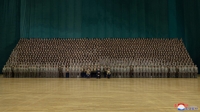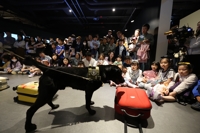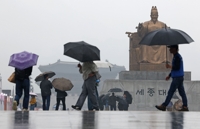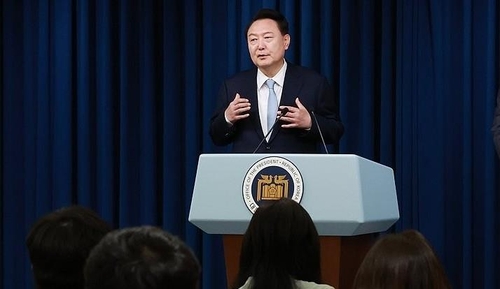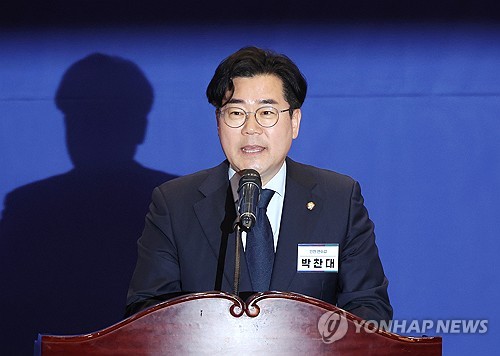(Yonhap Interview) dal.komm's robot cafes offer futuristic way to get coffee fix
By Kim Eun-jung
SEOUL, May 8 (Yonhap) -- Need your caffeine fix but short on time? Then order and pay for an iced latte on an application and pick it up at an automated mini cafe called "b;eat."
A robot barista makes fresh brewed coffee with an espresso machine inside of the 2-meter-wide, 2.1-meter-tall glass stall, developed and operated by local franchise dal.komm COFFEE. When your drink is ready, press pin numbers on the touchpad and you're good to go.
Ji Sung-won, the chief executive of dal.komm (meaning sweet in Korean), says b;eat offers a quick caffeine fix for time-crunched millenials who want to drink decent coffee at affordable prices.
"The quality of coffee served by b;eat is just as good as ones brewed by baristas at dal.komm stores because the robot cafe uses the same beans and high-end espresso machine as regular shops," Ji said in a recent interview with Yonhap News Agency at his office in Bundang, south of Seoul.
"As the robot cafe takes orders and payment via an app or a kiosk, customers don't have to wait in line during busy hours. In that sense, b;eat is more like a pickup place."
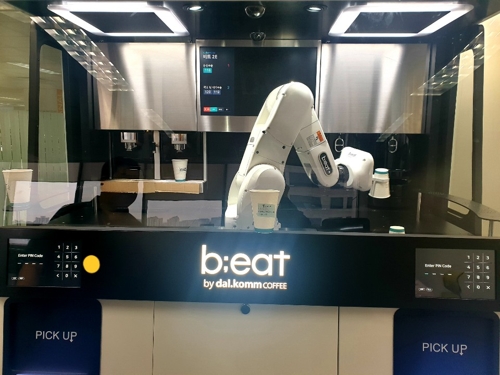
A robot barista, called b;eat, in dal.komm's office makes coffee in this photo taken on May 6, 2019. (Yonhap)
While leading franchises here focus on creating a comfortable environment for social outings and charge about 4,000-5,000 won ($3.40-4.30) for an Americano, the robot cafe targets a niche market for grab-and-go customers by cutting labor and rental fees, Ji said.
A hot Americano at b;eat costs between 1,000 and 2,000 won depending on where it is located, with in-house cafeterias usually charging less for employees, the company said. The robot barista can make up to 120 Americanos per hour.
A robot barista can serve several menu items containing ice and milk because managers called "b;eatvisors" clean the espresso machine and replenish supplies every day. The machine can also clean itself and supports a remote management system for maintenance and other checkups.
"From the consumer's side, b;eat's strength lies in serving cheap, delicious coffee at any time. For operators, it reduces overhead costs and offers an easy maintenance solution," the 40-year-old entrepreneur said. "The machine gets checked every day in accordance with dal.komm's manual. Otherwise, it is designed not to operate."
Ji said dal.komm first envisioned the robot cafe in 2017 to take advantage of fully automatic high-end espresso machines that cost about 30 million won here, which were too big to fit inside a normal vending machine.
The company managed to develop and launch a robot cafe within a year thanks to engineers at mobile payment platform Danal, which launched the coffee franchise in 2011.
After operating the first model, the company felt the need to upgrade it and joined hands with local telecom giant KT Corp. to adopt its 5G network and artificial intelligence (AI) solution to create a second version, called b;eat 2E.
The company said b;eat 2E is much faster and slimmer than the first version and that it provides more advanced services with a voice command function, LED screen on the robotic arm and CCTVs to track customers' movements.
"After giving birth to the first child, we felt like a lot more needed to be done to better serve customers," said Ji, who has a bachelor's degree in computer engineering and served in major posts at Danal before joining dal.komm. "The second version is mostly complete in terms of hardware. We need to work on the software as well as operation and management process."
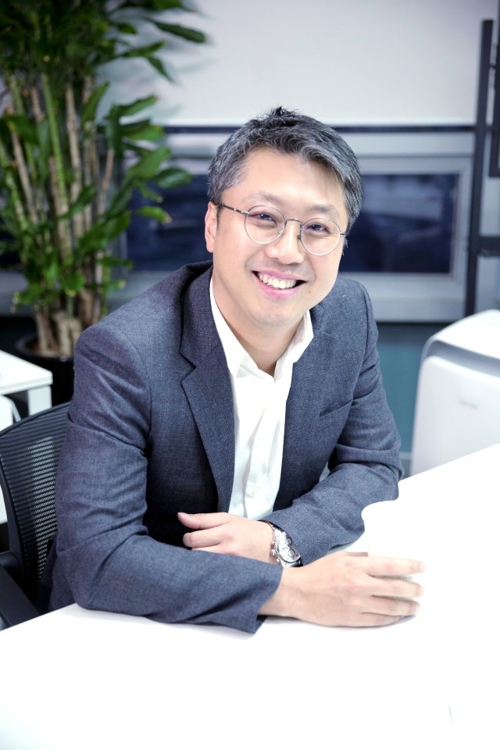
Ji Sung-won, CEO of dal.komm COFFEE, is shown in this photo provided by the coffee franchise on May 7, 2019. (Yonhap)
The company, which has already opened 45 robot cafes in office cafeterias, university campuses and shopping malls, aims to open over 200 this year and is well on the way, he said.
"We are currently focusing on the B2B (business-to-business) market as more companies have shown an interest in having unmanned cafes after a hike in minimum wages weighed on the operating costs of their in-house cafeterias," Ji said. "Subway and train stations are also promising markets as the robot cafe can serve customers round the clock."
While dal.komm's integration of cafes and digital technology has led it to be labeled with the starkly contrasting titles of Fourth Industrial Revolution leader and job thief, Ji underlined that his business is shifting jobs, not replacing them, in line with the latest industry trend.
"We're employing a lot of people in the robot manufacturing and assembly line, and it has also created a new category of jobs for maintenance and management of the machine," Ji said. "We're not just taking away jobs."
Despite the recent fall of several local coffee franchises in the face of fierce competition, dal.komm's robot cafe has struck the right cord with investors looking for new business models with high growth potential.
The company raised 15.5 billion won from eight investors last year.
The CEO said the company aims to have 300 coffee shops and 300 robot cafes by next year to strengthen the franchise's brand image and pave the way for its outreach in the global market with the futuristic cafe.
"The emergence of robot baristas doesn't mean the fall of traditional coffee shops, but it signals the dawn of a new kind of coffee culture," he said. "Despite all the talk about cool technologies, we're not talking about a robot business. Our primary focus is on how to offer the best coffee experiences for people."
ejkim@yna.co.kr
(END)
-
 BTS' Jungkook's 'Seven' chosen as hottest hit outside U.S.
BTS' Jungkook's 'Seven' chosen as hottest hit outside U.S. -
 From pastime to academic discipline: Exhibition spotlights evolution of Korean embroidery
From pastime to academic discipline: Exhibition spotlights evolution of Korean embroidery -
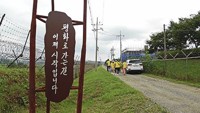 Gov't to open 10 trails near DMZ for visitors next month
Gov't to open 10 trails near DMZ for visitors next month -
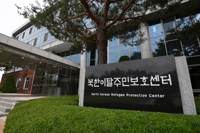 Number of N. Korean defectors entering S. Korea reaches 43 in Q1
Number of N. Korean defectors entering S. Korea reaches 43 in Q1 -
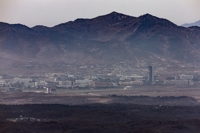 N. Korea dismantles S. Korean building near shuttered Kaesong complex
N. Korea dismantles S. Korean building near shuttered Kaesong complex
-
 From pastime to academic discipline: Exhibition spotlights evolution of Korean embroidery
From pastime to academic discipline: Exhibition spotlights evolution of Korean embroidery -
 BTS' Jungkook's 'Seven' chosen as hottest hit outside U.S.
BTS' Jungkook's 'Seven' chosen as hottest hit outside U.S. -
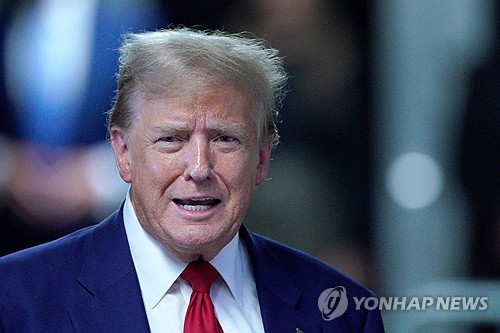 Trump suggests U.S. could withdraw its troops if S. Korea does not contribute more to support USFK: TIME
Trump suggests U.S. could withdraw its troops if S. Korea does not contribute more to support USFK: TIME -
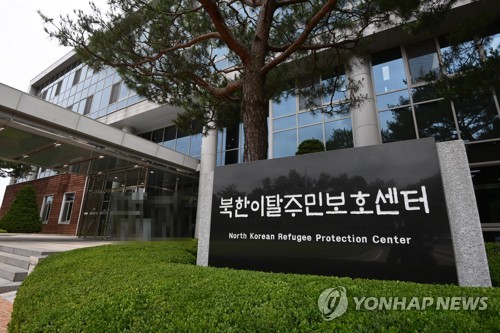 Number of N. Korean defectors entering S. Korea reaches 43 in Q1
Number of N. Korean defectors entering S. Korea reaches 43 in Q1 -
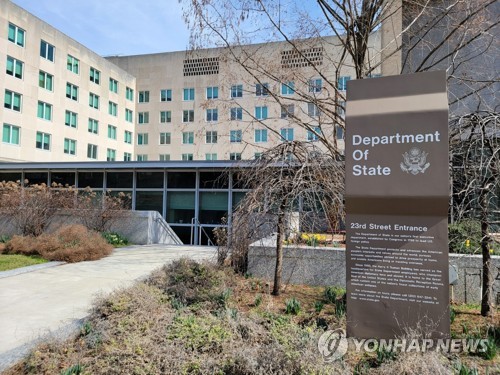 (Yonhap Interview) U.S. will do 'all' it can to back S. Korea in case of China's economic coercion: official
(Yonhap Interview) U.S. will do 'all' it can to back S. Korea in case of China's economic coercion: official
-
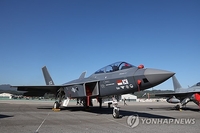 Indonesia proposes cutting payment for joint fighter jet project with S. Korea to one-third
Indonesia proposes cutting payment for joint fighter jet project with S. Korea to one-third -
 (Yonhap Interview) U.S. will do 'all' it can to back S. Korea in case of China's economic coercion: official
(Yonhap Interview) U.S. will do 'all' it can to back S. Korea in case of China's economic coercion: official -
 S. Korea's working-age population to dip nearly 10 mln by 2044 amid low births
S. Korea's working-age population to dip nearly 10 mln by 2044 amid low births -
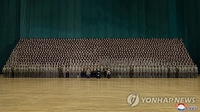 N.K. leader calls on public security officials to 'firmly defend' state unity
N.K. leader calls on public security officials to 'firmly defend' state unity -
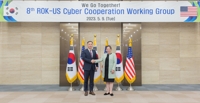 S. Korea to participate in U.S.-led cyber exercise this week
S. Korea to participate in U.S.-led cyber exercise this week
















